People requested more boardgaming posts, so:
Dice are what a lot of people think of when they think of board games (well, that or tiles with letters on), thanks to childhoods spent playing roll-and-move games like Sorry! or snakes-and-ladders. Because of this, many designers have tried to incorporate dice into board games in different ways. Not, generally speaking, in a roll-and-move sense; instead, designers usually try to use the random-but-not-quite-that-random allocation of numbers that dice present to their advantage.
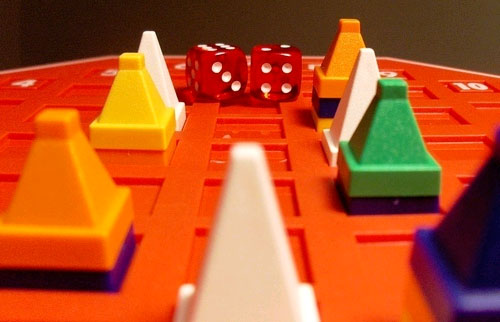
Can’t Stop! is one of the older examples of using dice in a non-traditional sense: this is a design by the late, great Sid Sackson (who designed hundreds of games, most notably Acquire). In Can’t Stop!, the dice are used in a way not unlike the way they’re used in craps: you roll four dice, and combine the dice to make two numbers (a five and a nine, an eleven and a six, two eights, etc.). Then you advance your markers along those number-tracks. Then you decide if you want to roll again, and if you roll numbers and can advance markers (you can advance up to three markers per turn, but no more); if you can’t roll the numbers for your markers, though, you lose all the progress you’ve made that turn. Can’t Stop! is a fast little game about pushing your luck, which is something dice are good for doing.
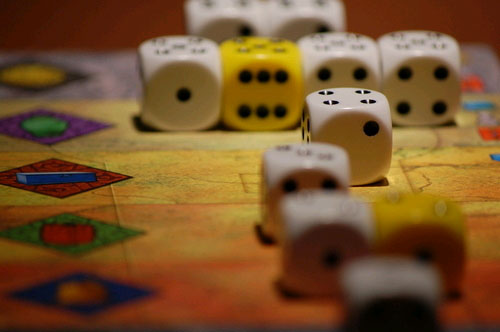
Can’t Stop! isn’t particularly representative of modern dice games, though. Yspahan (which I think is pronounced “Ees-pa-hohn,” but don’t quote me on that) is more in that vein, where the random roll of dice represents, in a sense, the allocation of supplies within a certain amount. Yspahan’s dice rolls represent the allotment of supplies (camels, gold, buildings, and special cards) purchasable by all of the players, which can then be used to build up in the various city sections of the board. It’s a pretty simple realization of dice being used to generate random stuff but using the probabilities of various amounts rolled accordingly, and a good application of the rule that any game with camels in it will be reasonably good. (There are no outright bad games with camels in them, and more than a few truly great games with camels in them. There is just something about camels.)
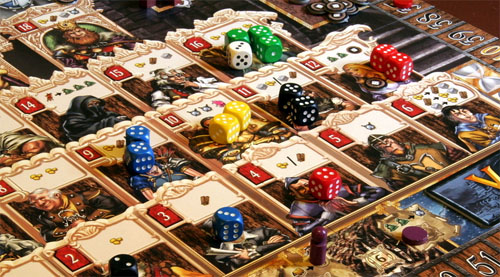
Kingsburg does sort of the same thing. Here, the trick is thinking of your dice (each player gets their own dice!) as sort of being your servants: you rolls your dice, and their totals tell you where you can send them to influence people at court for assistance as you build up your part of the kingdom. With three dice, the King himself is hardest to influence (as he requires an 18); meanwhile a lowly sergeant only needs a 5. The various elements of court get you resources: soldiers, building materials, and stuff that lets you influence future rolls of the dice. You then use the building materials to build buildings for extra abilities – much like a civilization-building sort of game – and the soldiers to defend yourselves from the waves of bandits and zombies and orcs that attack each year. Kingsburg is a pretty popular game because, firstly, you get your own dice and everybody likes having their own dice, but also because bad rolls won’t necessarily hurt you: strategic placement of your low-roll dice can mean you get to influence multiple courtiers while other players with better rolls only influence one (since each courtier can only be influenced by one player, normally).
An additional note: there is an expansion for this game, one element of which (a variant on how the military defense of the realm works) is absolutely mandatory for the game to truly shine. The rest of the expansion is pretty awesome too (variant buildings, more buildings, opportunity to play as characters with different abilities, a random event deck), which means for the “full” game Kingsburg is essentially more expensive than it should be. But it’s a really fine game.
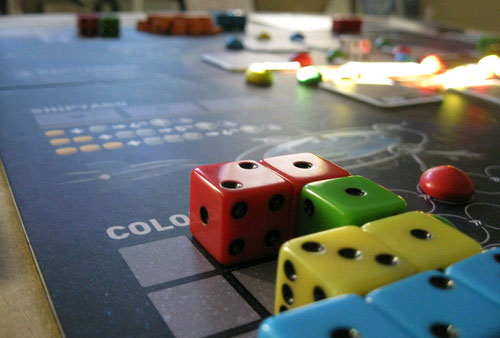
Alien Frontiers was released last year (initially through Kickstarter) and is currently very much a Hot Thing with serious boardgamers. I am not a fan of it, personally, because I find that although the theme (alien planet colonization) is fun, the actual gameplay bores me: there’s no real ability to plan out your turn in advance. When your turn comes, you simply roll your dice and place them as best you can to get benefits, and that’s it. If this sounds underwhelming – well, I was underwhelmed by it. Very pretty pieces, though, and lovely graphic design. Some people quite like it. (These people are of course completely wrong and bad.)
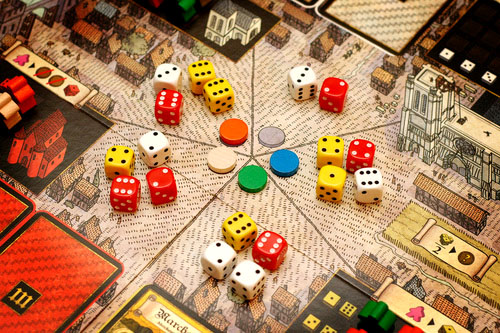
Troyes is the most recent dice-as-resources game to come along, and probably is the most complex. Here, you use dice for all the activities on the board, as in other games, but the twist in Troyes is that players can buy each other’s dice in order to use them, which means that each player’s supply is somewhat variable and you can’t rely on getting to use all of your dice – and further, most of the things you can use those dice for are similarly limited to a certain number of uses per turn, so each allocation of dice becomes quite strategic as a result. I’ve only played Troyes twice so far, and in terms of mechanics it’s really very clever (a little difficult in terms of learning curve – this isn’t a game for beginning boardgamers – but not insurmountable). The downside for Troyes is that it is game number 27452 where the theme is “let’s build and improve a town in Middle Ages Europe,” which is at this point almost actively repellent to many players because how many goddamn towns in Middle Ages Europe do you have to improve? Given Troyes’ mechanics it could have been about almost anything else, but European designers really do goddamn love improving towns in Middle Ages Europe.
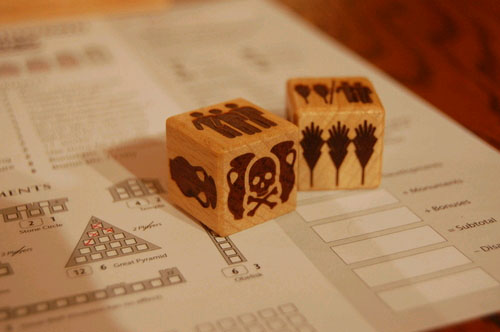
Going from advanced to suitable-for-beginners, Roll Through The Ages is a civ-building game based solely around dice – albeit special dice with fancy symbols on them. Roll Through The Ages cribs from Yahtzee in that you roll your dice and then get a couple of opportunities to reroll certain dice to alter what you receive. You can then use the resources your dice have generated (workers, food, and trade goods) to build up your civilization by researching technologies (which give you additional abilities), building wonders (victory points at the end of the game) and building cities (which give you additional dice, but also require additional food to keep from starving). Roll Through The Ages is a favorite of mine: it’s quick, simple and fun. Also because it is a dice game where you can inflict plagues on other people.
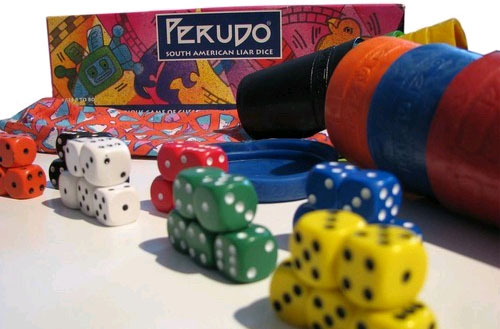
Finally, we have Perudo, or as it is more commonly known, Liar’s Dice, or sometimes The Dice Game They Were Playing In The Second Pirates of the Caribbean Movie. Liar’s Dice is dead simple: everybody gets a cup and five dice, and each player uses their cup to roll their dice and check them to see what they rolled. Then you start bidding, based on what everybody has rolled (of which, you only know your own dice). “Three twos.” “Four twos.” “Four fives.” “Six fives.” “Seven threes.” Et cetera. Until somebody says “you’re lying,” and then you all reveal dice: if your bid was true and there really were seven threes (or whatever), the player who called your bluff loses a die. If your bid failed, you lose a die. And then you continue like this until only one person is left. Variant rules for Liar’s Dice are common as dirt: the most widely used rule is that ones are wild (which in turn means that a bid of ones is twice as valuable as any other bid). Liar’s Dice is simple and straightforward, and the bluffing element makes for a fun, riotous game. (Any game where people swear a lot when a bluff is called is a good game so far as I am concerned.)
EDIT TO ADD: As always, Canadian readers interested in purchasing any of these games are advised to consider Meeplemart, which routinely has the best prices for games in Canada. As in “it’s not even close.”


Related Articles
15 users responded in this post
Wow, I loved Acquire, but no one I knew could stand to sit through a whole game. I tried it solitaire a few times, but there were video games to play.
Gaming huzzah! You are an excellent teacher/pusher/font of information and opinion, good sir. I hope for more.
I thought snakes and ladders (chutes and ladders) had a spinner instead of dice.
And now, the most awesome dice on the internet:
http://www.shapeways.com/model/126266/thorn_dice_set_with_decader.html?gid=mg
I tried Kingsburg and enjoyed it, but it also seemed a cheater’s paradise. So many little bits to move around, and it’s hard to keep track of what everyone is doing.
Hot damn I love designing around dice. My favorite thing is actually using the physicality of their shape as an element of gameplay. For example, Utara uses scattered dice as a randomized terrain:
http://danielsolisblog.blogspot.com/2011/02/utara.html
http://danielsolisblog.blogspot.com/2011/03/etched-utara-dice-costs-of-custom-dice.html
And Pip•Pip uses each face to create a slightly mathy three-dimensional abstract game.
http://danielsolisblog.blogspot.com/2010/08/pip-pip.html
I’d like to chime in with a dice game with excellent theme, and a stepping-stone to one of the jewels of boardgaming: Dune Express. Inspired by the “express” versions of classic boardgames, this has the mechanics of Yahtzee with the excellent theme of Frank Herbert’s Dune novel. The advanced rules include special powers for each faction. It was good fun for playing during lunch-breaks.
Alien frontiers is excellent. The meat of it (to me, at least) is acquiring technologies and using them to manipulate the dice. You can add, subtract, flip (as above, using the physical properties of the dice), use a die in multiple sets…. The area control aspects of the game also add to the number of things to consider.
A recent dice game I’ve enjoyed is “Alea Iacta Est” from Rio Grande, sort of a Yahtzee + Roman theme + more strategy mix. And everyone gets their own dice!
Recently purchased and played Lords of Vegas – which is a great dice roller, even if it’s just trying to get the highest number to control a casino, rather than looking for combinations.
I kind of agree with you about Alien Frontiers – I learnt it at the same convention (Bordercon) and found it somewhat lacking. I think it’s a good game to teach people the principles of Eurogames, but is a bit too soul-less for my liking.
To clarify – Bordercon was the same convention where I bought and played Lords of Vegas.
A couple favorites of mine:
To Court the King is, to quote a couple descriptions my friends and I have come up with, “Yahtzee with superpowers” or “like Kingsburg except completely different”. You start with three dice. On your turn, you roll your dice pool, set aside at least one die, and reroll the rest, until you’ve rolled all your dice. At that point, you can claim a character from the center of the table, based on what your dice are. Requirements range from “all even” or “add up to at least 15” or “three of a kind” for the low-level characters, all the way up to “six-die straight” or “two threes-of-a-kind” or “six of a kind” – and a seven of a kind will let you claim the Queen and immediately trigger endgame.
Each character has a power that can be used once per turn. Powers scale with the difficulty of acquiring a character, like “adjust a die’s value up or down one” or “add a die to your pool with value 3” or “reroll an extra die before setting one aside”.
The endgame is everyone trying to get the highest quantity of the highest value they can, with the seven-of-a-kind roll that claimed the Queen as the first roll to beat – everyone gets one shot at it, in order, with the Queen-claimant getting one last shot at beating anyone that had topped the original seven-of-a-kind. Seven sixes can be beat by eight ones, and so forth.
Another recent favorite is James Ernest and Mike Selinker’s Lords of Vegas – it’s a geographic property-claiming game where the dice represent each person’s investment in, and stake of, the casino’s profits. The owner of the highest single die, however, is the casino boss, and gets the victory points for the whole block whenever it’s scored. It’s a little Acquire-ish, but the dice make a clever twist – especially when a minority partner pays the money to attempt a “reorganization” of a casino and rolls all the dice involved.
meeplemart is good, but i’ve found the same prices or better at germangames.com
anyways, interesting piece on dice. more like this please!
Lurker’s first post, etc. Anyway, I just wanted to mention that Liar’s Dice is ridiculously common in China. In virtually every bar or club (that’s not SUPER trendy and laowai-oriented) if you can ask for dice and you’ll get a cup and five dice.
I’ve spent, and seen many others spend, entire nights at clubs just playing Liar’s Dice and drinking while everyone else around them dances.
I didn’t even know the game existed outside of China until this post, actually…
#GreatFirstPost #RightGuys
Ra: The Dice Game is a nice time filler.
Second asdf’s recommendation of germangames.com. Prices over-all as good or better than Meeplemart, as good or better selection. Which one I go with usually depends on which one has the games I want in stock at the moment I want them, but price differentials are rarely > $2 per game, sometimes favouring Meeplemart, sometimes German. Unlike most online retailers (and ALL brick’n’mortars, it seems), both these guys understand that the US dollar is at par, and adjust prices accordingly.